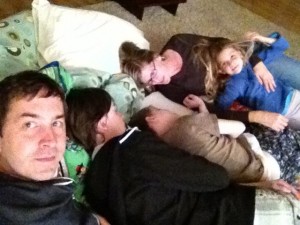Spaces
Jackson and Clara take lunch to school every day so I try to have healthy and convenient items on hand for them to pack. I make granola bars, smoothies and muffins in batches to store in the freezer. I don’t enjoy making this stuff but I derive enough pleasure knowing my kids are getting nutritious foods without all that wasteful packaging that the task is worth it. The other day, after I finished baking a few dozen muffins I felt so satisfied as I thought, “This batch could take me well into April.”
It was a fleeting moment of happiness knowing that the freezer was stocked, that I wouldn’t be faced with muffin baking again for a few months. Because my next thought was this: I wonder if Sam will still be here in April. Which of these pumpkin muffins cooling on the rack might outlast my boy? It didn’t seem right that a baked good should be around after Sam was gone. I hated those muffins for their good fortune.
This is the new reality I guess. The highs and lows. The happiness and grief. All living side-by-side, taking turns in the spotlight.
Compartmentalization. That’s the term a Unitarian Universalist minister used when he described how he was able to leave the bedside of a man dying of cancer in the hospital and walk out to the parking lot only to be horrified to discover that he had spilled coffee on his khaki pants. How could he possibly be concerned with something so trivial when there was someone dealing with much bigger issues inside? But to live with the grief constantly would be impossible. If we had to hold all the horrors of the world with us on a conscious level at all times we’d go mad. We can inhabit only a small fraction of the realities that exist at any given time.
We’ve talked to Jackson and Clara about this, explaining that even when their brother starts getting sicker there will be times they feel like laughing with their friends. And that it’s okay.
I have to remind myself of this too.
Sometimes living between the two extremes gets uncomfortable. Like when I write a new blog post here and inhabit that moment of sadness and tears, until I publish it. Then I get in my car to go to the store. Maybe I listen to an episode of “This American Life” that helps me shift into a better mood. Then you and I run into each other at the store and you’ve just read my post. When you see me you’re reminded of it and you go into that space in your head. But I’m in the space of should I buy of six-pack of Sierra Nevada or just go for the full case because, who am I trying to fool, David and I will drink all twelve eventually. And you mention my recent post, and I’m glad because it makes me feel less alone in this whole thing, but now I feel a bit guilty for feeling happy that the beer was on sale. How can I be happy when my son is going to die soon? And when you eye the case of beer in my hands I worry it looks like I’m going to drown my sorrows in alcohol. That’s what I would be thinking if I was in your place. Not judging. No, definitely not judging.
Yesterday David and I got a call from Sam’s nephrologist. The most recent labs indicate his kidney function is still rapidly declining, enough that she has ordered restrictions on his fluid intake. We had hope that after the last set of labs things would have slowed down. But no.
David was in the middle of work and I was dealing with my own hectic day. So after we hung up with the doctor I drew a square in the air with my hands. “I’m putting it all in there right now. Because I need to be able to function out here.”
And that’s my sad compartment for Sam. I open it when I’m writing or when talking with David or when Clara asks if we can bury Sam in our backyard so he’ll always be close. I don’t think she has a compartment. Or if she does it’s always open. Jackson’s, on the other hand, is like one of those wooden puzzle boxes. Only a specific set of movements in a particular order can unlock it. So very tricky.
